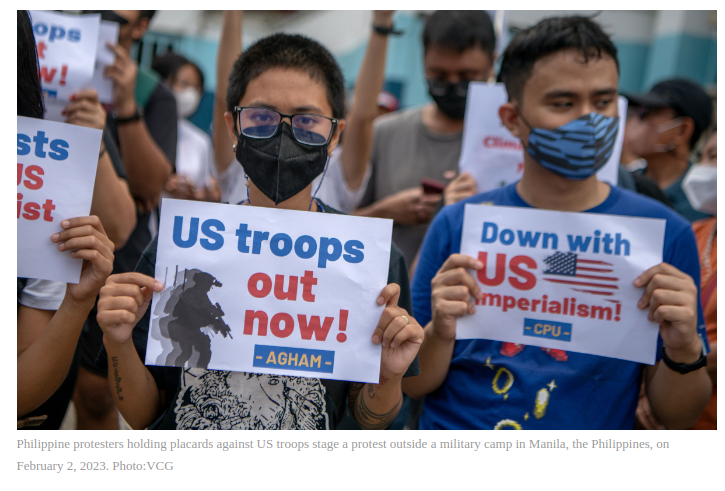
Washington is expected to use the strengthening of the US- Philippines military alliance as a lever to further tighten its grip over the Philippines, but such acts will only harm interests of the Philippines and endanger stability and peace in the Southeast Asia region, Chinese experts warned, as Philippine President Ferdinand Marcos Jr is about to kick off his visit to the US.
During the four-day visit, Marcos is expected to meet US President Joe Biden and reach agreements on greater business engagement, as well as stepping up military enhancements, Reuters reported citing a senior Biden administration official.
Just one day before their meeting, the US further undermined stability in the South China Sea region by voicing its support to the Philippines over an incident involving China in a statement by US Department of State on Saturday.
“The US called China to desist from ‘provocative and unsafe conduct’ in the South China Sea,” and it stressed the US stands with the Philippines and threatens that any armed attack on Philippines armed forces would invoke mutual defense commitments between US and the Philippines.
Two Philippine Coast Guard vessels on April 23 intruded into the waters off the Ren’ai Reef without Chinese permission. The intrusion of the Philippine vessels carrying journalists into the Ren’ai Reef waters was a premeditated provocation designed to deliberately create friction, and cast blame on China by hyping up events in the media, according to Mao Ning, a spokesperson from Chinese foreign ministry on Friday.
The US’ hype of South China Sea issue is a part of its move to rope in the Philippines to counter China ahead of the meeting between Biden and Marcos, during which they are likely to discuss enhancing military, defense cooperation, take further actions to provoke stability of Taiwan Straits, South China Sea and the entire region, Chen Xiangmiao, director of the world navy research center at the National Institute for South China Sea Studies told the Global Times on Sunday.
The US’ intention of dragging the Philippines into the competition between China and the US and making it a pawn are clearly seen in previous stepping-up engagement between the US and the Philippines, Chen noted.
The meeting between Biden and Marcos comes against the backdrop of the US attempting to enhance military ties with the Philippines through various approaches in order to contain China.
On April 11, the US and the Philippines started their “largest-ever” military drills, which lasted until April 28. A “2+2” meeting of the defense and foreign ministers from the two sides was held on April 11 amid their live-fire drills in waters in the South China Sea. Also in April, the US gained access to four new military bases in the Philippines, bringing the total number to nine, with several bases close to China’s island of Taiwan.
An expanded Enhanced Defense Cooperation Agreement (EDCA) that gives the US access to military bases in the Southeast Asian country are likely to be discussed, Chen noted. Under the agreement, the bases will allow the US military to deploy its troops, weapons and equipment, according to Reuters.
Some tried to find excuse for the new EDCA sites by citing the safety of the 150,000 Overseas Filipino Workers in Taiwan…. The Philippines is advised to unequivocally oppose ”Taiwan independence” rather than stoking the fire by offering the US access to the military bases near the Taiwan Straits if you care genuinely about the 150,000 OFWs, Chinese Ambassador to the Philippines Huang Xilian said at the 8th Manila Forum earlier this month.
The Philippines should keep in mind that in an attempt of fulfilling its goal to counter China, the US is using its military alliance with the Philippines as a lever to increase its presence in the region. Being dragged by the US into its competition with China will not only harm interests of the Philippines but also obstruct ties between China-Philippines, Chen noted.
“Participating in any war does not serve our national interest. We must never allow our territory to become a launch pad for an offensive attack against another state,” former Philippine presidential spokesperson Harry Roque wrote in an article published in the Daily Tribune on February 7.
Chen called upon the Philippines to make decisions based on the best interests of the Philippines to avoid becoming a pawn of the US against China, not derail cooperation and avoid big fluctuations in bilateral ties. The price would entail sacrifice in the economic and trade field and pose pressure to the political and security integration within ASEAN, he noted.
Benefiting from close economic communications and people-to-people exchanges and common consensus between high level of the two countries, ties between the two countries have enjoyed stability and a strong foundation, but we should prevent disruptive factors brought by the US, Chen noted.
In an opinion piece published in the Global Times, Anna Malindog-Uy, director and vice president for external affairs of the Asian Century Philippines Strategic Studies Institute, warned the Marcos government in the Philippines to avoid so-called “strategic ambiguity” similar to Taiwan policy pursued by the US. Under this strategy, the US is saying one thing and doing another as it only serves to satisfy its own geostrategic and hegemonic interests at the expense of others’ interests.
The Philippines should not compromise itself for the geopolitical interests and agenda of the US in containing China’s rise to preserve its hegemony in the world, the Manila-based expert wrote.
By
Global Times reporter on society, cybersecurity, diplomatic relations and topics related to Xinjiang.
source : https://www.globaltimes.cn/page/202304/1289996.shtml?id=12